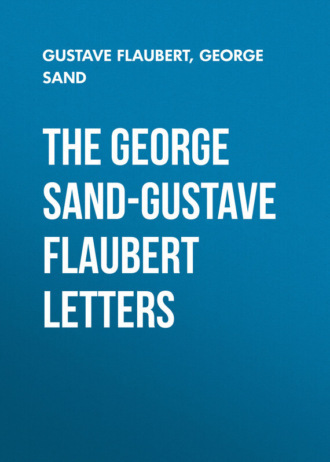 полная версия
полная версияThe George Sand-Gustave Flaubert Letters
Do you notice how rare literary sense is? The knowledge of language, archeology, history, etc., all that should be useful however! Well! well! not at all! The so-called enlightened people are becoming more and more incompetent in the matter of art. Even what art means escapes them. The glosses for them are more important than the text. They pay more attention to the crutches than to the legs themselves.
CII. TO GUSTAVE FLAUBERT 1st January, 1869
It is one o'clock, I have just embraced my children. I am tired from having spent the night in making a complete costume for a large doll for Aurore; but I don't want to turn in without embracing you also, my great friend, and my dear, big child. May '69 be easy for you, and may it see the end of your novel. May you keep well and be always yourself! I don't know anything better, and I love you.
G. Sand
I have not the address of the Goncourts. Will you put the enclosed answer in the mail?
CIII. TO GUSTAVE FLAUBERT, at Croissset
Nohant, 17 January, 1869
The individual named George Sand is well: he is enjoying the marvelous winter which reigns in Berry, gathering flowers, noting interesting botanical anomalies, making dresses and mantles for his daughter-in-law, costumes for the marionettes, cutting out scenery, dressing dolls, reading music, but above all spending hours with the little Aurore who is a marvelous child. There is not a more tranquil or a happier individual in his domestic life than this old troubadour retired from business, who sings from time to time his little song to the moon, without caring much whether he sings well or ill, provided he sings the motif that runs in his head, and who, the rest of the time, idles deliciously. It has not always been as nice as this. He had the folly to be young; but as he did no evil nor knew evil passions, nor lived for vanity, he is happy enough to be peaceful and to amuse himself with everything.
This pale character has the great pleasure of loving you with all his heart, and of not passing a day without thinking of the other old troubadour, confined in his solitude of a frenzied artist, disdainful of all the pleasures of this world, enemy of the magnifying glass and of its attractions. We are, I think, the two most different workers that exist; but since we like each other that way, it is all right. The reason each of us thinks of the other at the same hour, is because each of us has a need of his opposite; we complete ourselves, in identifying ourselves at times with what is not ourselves.
I told you, I think, that I had written a play on returning from Paris. They liked it; but I don't want them to play it in the spring, and the end of the winter is filled up, unless the play they are rehearsing fails. As I do not know how to WISH my colleagues ill luck, I am in no hurry and my manuscript is on the shelf. I have the time. I am writing my little annual novel, when I have one or two hours a day to get to work on it; I am not sorry to be prevented from thinking of it. That develops it. Always before going to sleep, I have an agreeable quarter of an hour to continue it in my head; there you have it.
I know nothing, nothing at all of the Sainte-Beuve incident. I get a dozen newspapers, whose wrappers I respect to such an extent that without Lina, who tells me the chief news from time to time, I would not know if Isidore were still among us.
Sainte-Beuve is very high tempered, and, as regards opinions, so perfectly skeptical, that I should never be astonished at anything he did, in one sense or the other. He was not always like that, at least not so much so. I have known him to be more credulous and more republican than I was then. He was thin and pale, and gentle; how people change! His talent, his knowledge, his mind have increased enormously, but I used to like his character better. Just the same, there is still much good in him. There is still love and reverence for letters – and he will be the last of the critics. Criticism rightly so-called, will disappear. Perhaps there is no longer any reason for its existence. What do you think about it?
It appears that you are studying the boor (pignouf). As for me, I avoid him. I know him too well. I love the Berrichon peasant who is not, who never is, a boor, even when he is of no great account; the word pignouf has its depths; it was created exclusively for the bourgeois, wasn't it? Ninety out of a hundred provincial middle- class women are boorish (pignouf lardes) to a high degree, even with pretty faces that ought to give evidence of delicate instincts. One is surprised to find a basis of gross self-sufficiency in these false ladies. Where is the woman now? She is becoming a freak in society.
Good night, my troubadour: I love you, and I embrace you warmly;
Maurice also.
G. Sand
CIV. TO GEORGE SAND
Croisset, Tuesday, 2 February, 1869
My dear master,
You see in your troubadour a worn-out man. I have spent a week in Paris, looking up wearisome information (from seven to nine hours in fiacres every day, which is a fine way to make money out of literature). Oh, well!
I have just reread my outline. All that I have still to write horrifies me, or rather disgusts me, so that I want to vomit. It is always so, when I get to work. It is then that I am bored, bored, bored! But this time exceeds all others. That is why I dread so much interruptions in the daily grind. I could not do otherwise, however. I dragged about at funerals at Pere-Lachaise, in the valley of Montmorency, through shops of religious objects, etc.
In short, I have enough material for four or five months now. What a big "Hooray" I shall utter, when it is finished, and when I am not in the midst of remaking the bourgeois! It is high time that I enjoyed life.
I saw Sainte-Beuve and the Princess Mathilde, and I know thoroughly the story of their break, which seems to me irrevocable. Sainte- Beuve was outraged against Dalloz and has gone to le Temps. The princess begged him not to do anything about it. He did not listen to her. That is all. My opinion on it, if you wish to know it, is this. The first wrong was done by the princess, who was hasty; but the second and the worst was by pere Beuve, who did not behave as a courteous man. If one has a friend, a rather good fellow, and that friend has given one thirty thousand francs a year income, one owes him some consideration. It seems to me that in Sainte-Beuve's place I should have said, "That displeases you, let us talk no more about it." He lacked manners and poise. What disgusted me a little, between ourselves, was the way he praised the emperor to me! yes, he praised Badinguet, to me! – And we were alone!
The princess had taken the thing too seriously from the beginning. I wrote to her, saying that Sainte-Beuve was right; he, I am sure, found me rather cold. It was then, in order to justify himself to me, that he made these protestations of isidorian love, which humiliated me a little; for it was as if he took me for a complete imbecile.
I think that he is preparing for a funeral like Beranger's, and that Hugo's popularity makes him jealous. Why write for the papers, when one can make books, and when one is not perishing of hunger? He's no sage, Sainte-Beuve. Not like you!
Your strength charms me and amazes me. I mean the strength of your entire being, not only that of your brain.
You speak of criticism in your last letter to me, telling me that it will soon disappear. I think, on the contrary, that it is, at most, only at its dawning. They are on a different tack from before, but nothing more. At the time of La Harpe, they were grammarians; at the time of Sainte-Beuve and of Taine, they are historians. When will they be artists, only artists, but really artists? Where do you know a criticism? Who is there who is anxious about the work in itself, in an intense way? They analyze very keenly the setting in which it was written, and the causes that produced it; but the UNCONSCIOUS poetic expression? Where it comes from? its composition, its style? the point of view of the author? Never.
That criticism would require great imagination and great sympathy.
I mean a faculty of enthusiasm that is always ready, and then
TASTE, a rare quality, even among the best, so much so that one does not talk about it any longer.
What irritates me every day, is to see a master-piece and a disgrace put on the same level. They exalt the little, and they lower the great, nothing is more imbecile nor more immoral.
At Pere-Lachaise I was seized with a profound and sorrowful disgust for humanity. You can not imagine the fetichism of the tombs. The real Parisian is more of an idolater than a negro is! It made me long to lie down in one of the graves.
And the PROGRESSIVES think that there is nothing better than to rehabilitate Robespierre! Note Hamel's book! If the Republic returned they would bless the liberty poles out of policy and believing that measure strong.
When shall I see you? I plan to be in Paris from Easter to the end of May, This spring I shall go to see you at Nohant, I swear it.
CV. TO GUSTAVE FLAUBERT
Nohant, 11 February, 1869
While you are running around to get material for your novel, I am inventing all sorts of pretexts not to write mine. I let myself be distracted by guilty fancies, something I am reading fascinates me and I set myself to scribbling on paper that will be left in my desk and bring me no return. That has amused me, or rather that has compelled me, for it would be in vain for me to struggle against these caprices; they interrupt me and force me…you see that I have not the strength of mind that you think.
As for our masculine friend, he is ungrateful, while our feminine friend is too exacting. You were right; they are both wrong and it is not their fault, it is the social machinery which insists on it. The kind of recognition, that is to say, submission that she exacts, depends on a tradition that the present time still profits by (there lies the evil); but does not accept any longer as a duty. The notions of the obliged are changed, those of the obliger ought to change also. It must be said that one does not buy moral liberty by any kindness, – and as for him, he should have foreseen that he would be considered enchained. The simplest thing would have been not to care about having thirty thousand francs a year. It is so easy to do without it. Let him extricate himself. They won't entangle us in it: we aren't so foolish!
You say very good things about criticism. But in order to do as you say, there must be artists, and the artist is too much occupied with his own work, to forget himself in estimating that of others.
Heavens, what fine weather! Don't you enjoy it, at least from your window? I'll wager that the tulip tree is in bud. Here, the peaches and the apricots are in flower. It is said that they will be ruined; that does not stop them from being pretty and not tormenting themselves about it.
We have had our family carnival: my niece, my grandchildren, etc. We all put on fancy dress; it is not difficult here, one only has to go to the wardrobe and one comes down again as Cassandra, Scapin, Mezzetin, Figaro, Basile, etc., all that is very pretty. The pearl was Lolo as a little Louis XIII in crimson satin, trimmed with white satin fringed and laced with silver. I spent three days in making this costume, which was very chic; it was so pretty and so funny on that little girl of three years, that we were all amazed in looking at her.
Then we played charades, had supper, and frolicked till daylight. You see that banished to a desert, we keep up a good deal of vitality. And that I delay all I can, the trip to Paris and the chapter of business. If you were there, I would not need to be urged. But you are going there the end of March if and I can not afford to wait till then. To conclude, you swear to come this summer and we count on it absolutely. Sooner than not have you come I shall go to drag you here by the hair. I embrace you most warmly on this good hope.
G. Sand
CVI. TO GUSTAVE FLAUBERT, at Croissset
Nohant, 24 February, 1869
I am all alone at Nohant as you are all alone at Croisset. Maurice and Lina have gone to Milan, to see Calamatta who is dangerously ill. Should they have the misfortune to lose him, they will have to go to Rome to settle his estate, an irksome task added to a sorrow, it is always like that. That sudden separation was sad, my poor Lina weeping at leaving her daughters and weeping at not being with her father. They left me the care of the children whom I rarely leave and who only let me work when they sleep; but I am happier at having this care on my shoulders to console me. I have, every day, in two hours news from Milan by telegram. The patient is better; my children are only as far as Turin today and do not know yet what I know. How this telegraph changes one's idea of life, and when the formalities and formulas are still more simplified, how full existence will be of facts and how free from uncertainties.
Aurore, who lives on adorations in the lap of her father and mother and who weeps every day when I am away, has not asked a single time where they are. She plays and laughs, then she stops; her great eyes stare, she says: MY FATHER? another time she says: MAMMA? I distract her, she thinks no more of it, and then she begins again. They are very mysterious, children! They think without understanding. Only one sad word is needed to bring out their sorrow. She carries it unconsciously. She looks in my eyes to see if I am sad or anxious; I laugh and she laughs, I think that we must keep her sensitiveness asleep as long as possible, and that she never would weep for me if they did not speak of me.
What is your advice, you who have brought up an intelligent and charming niece? Is it wise to make them loving and affectionate early? I thought so formerly: I was afraid when I saw Maurice too impressionable and Solange too much the opposite, and resisting affection. I would like little ones to be shown only the sweet and the good of life, until the time when reason can help them to accept or to fight the bad. What do you say?
I embrace you and ask you to tell me when you are going to Paris, my trip is delayed as my children may be absent a month; I shall be able, perhaps, to meet you in Paris.
Your old solitary,
G. Sand
What an admirable definition I rediscover with surprise in the fatalist Pascal!
"Nature acts progressively, itus et reditus. It goes on and returns, then it goes still further, then half as far, then further than ever." [Footnote: George Sand had copied this and fastened it over her work table at Nohant.]
What a way of speaking, eh? How the language turns, is twisted, made supple, is condensed under this grandiose "hand."
CVII. TO GEORGE SAND
Tuesday night
What do I say about it, dear master? Should one excite or repress the sensitiveness of children? It seems to me that one should not have any set rule about it. It is according as they have a tendency to too much or too little. Moreover, the basis isn't changed. There are tender natures and hard natures, irremediably so. And then the same sight, the same lesson can produce opposite effects. Could anything have hardened me more than having been brought up in a hospital and having played, as a child, in a dissecting amphitheatre? But no one is more sensitive than I am to physical suffering. It is true that I am the son of an extremely humane man, sensitive in the true meaning of the word. The sight of a suffering dog made tears come to his eyes. He did his surgical operations none the less well, and he invented some dreadful ones.
"Show little ones only the sweet and the good of life until the time when reason can help them to accept or to fight the bad." Such is not my opinion. For then something terrible, an infinite disenchantment is bound to be produced in their hearts. And then, how could reason form itself, if it does not apply itself (or if one does not apply it daily) to distinguish good from evil? Life ought to be a continual education; one must learn everything – from talking to dying.
You tell me very true things about the unconsciousness of children. He who could read clearly in these little brains would grasp in them the roots of the human race, the origin of the gods, the sap which produces actions later on, etc. A negro who talks to his idol, and a child who talks to her doll seem to me close together.
The child and the savage (the primitive) do not distinguish the real from the fantastic. I remember very clearly that at five or six years of age I wanted to "send my heart" to a little girl with whom I was in love (I mean my material heart). I could see it in the middle of straw, in a basket, an oyster basket.
But no one has been so far as you in these analyses. There are some infinitely profound pages about it in the Histoire de ma vie. What I say is true, since minds quite opposite to yours have been amazed at them. For instance, the Goncourts.
The good Tourgueneff ought to be in Paris at the end of March. What would be fine, would be for us all three to dine together.
I am thinking again of Sainte-Beuve. Without doubt one can get along without thirty thousand francs a year. But there is something easier yet: that is, when one has them, not to launch into abuse, every week, in the papers. Why doesn't he write books, since he is rich and has talent?
I am just now reading Don Quichotte again. What a tremendous old book! Is there any more beautiful?
CVIII. TO GUSTAVE FLAUBERT
Nohant, 7 March, 1869
Still alone with my grandchildren; my nephews and friends come to spend two out of every three days with me, but I miss Maurice and Lina. Poor Calamatta is at the last gasp.
Give me the address of the Goncourts, you have never given it to me.
Shall I never know it? My letter is still waiting there for them.
I love you and embrace you. I love you much, much, and I embrace you very warmly.
G. Sand
CIX. TO GUSTAVE FLAUBERT
Nohant, 12 March, 1869
Poor Calamatta died the 9th, my children are coming back. My Lina must be distressed. I have news from them only by telegraph. From Milan here in an hour and a half. But there are no details, and I am anxious. I embrace you tenderly,
G. Sand
Thank you for the address.
CX. TO GUSTAVE FLAUBERT, at Croissset
Nohant, 2 April, 1869
Dear friend of my heart, here we are once more calm again. My children returned to me very exhausted. Aurore has been a little ill. Lina's mother has come to get into touch with her about their affairs. She is a loyal and excellent woman, very artistic, and very amiable. I too have had a bad cold, but everything is getting better now, and our charming little girls console their little mother. If it were less bad weather, and I had a less bad cold, I would go at once to Paris, for I want to see you there. How long do you stay there? Tell me quickly.
I shall be very glad to renew my acquaintance with Tourgueneff, whom I knew a little without having read him, and whom I have since read with a whole-hearted admiration. You seem to me to love him a great deal; then I love him too, and I wish when your novel is finished, that you would bring him to our house. Maurice also knows him and appreciates him greatly, he who likes whatever does not resemble anything else.
I am working at my novel about TRAVELING ACTORS [Footnote: Pierre qui roule.] like a convict. I am trying to have it amusing and to explain art; it is a new form for me and amuses me. Perhaps it will not have any success. The taste of the day is for marquises and courtesans; but what difference does that make? – You must find me a title, which is a resume of that idea: THE MODERN ROMAN COMIQUE.
My children send you affectionate greetings; your old troubadour embraces his old troubadour.
G. Sand
Answer quickly how long you expect to stay in Paris. You say that you are paying bills and that you are vexed. If you have need of quibus, I have at the moment a few sous I can lend you. You know that you offered once to lend me some. If I had been in a hole I would have accepted. Give all my regards to Maxime Du Camp and thank him for not forgetting me.
CXI. TO GUSTAVE FLAUBERT
Nohant, 17 April, 1869
I am well, I am finishing (today, I hope) my modern Roman comique which will be called I don't know what. I am a little tired, for I have done a lot of other things. But I am going to Paris in eight or ten days to rest, to embrace you, to talk of you, of your work, to forget mine, God be thanked! and to love you as always very much and very tenderly.
G. Sand
Regards from Maurice and his wife.
CXII. TO GUSTAVE FLAUBERT
Monday, 26 April, 1869
I arrived last night, I am running around like a rat, but every day at 6 o'clock one is sure of finding me at Magny's, and the first day that you are free, come to dine with your old troubadour who loves you and embraces you.
Send word ahead to me, however, so that by an exceptional chance, I do not have the ill luck to miss you.
Monday.
CXIII. TO GUSTAVE FLAUBERT
Thursday evening, 29 April, 1869
I am back from Palaiseau and I find your letter. Saturday I am not sure of being free; I have to read my play with Chilly on account of some objections of detail, and I had told you so. But I see him tomorrow evening, and I shall try to get him to give me another day. I shall write you then, tomorrow evening, Friday, and if he frees me, I shall go to your house about three o'clock on Saturday so that we can read before and after dinner; I dine on a little fish, a chicken wing, an ice and a cup of coffee, never anything else, by which means my stomach keeps well. If I am kept by Chilly, we shall postpone till next week after Friday.
I sold Palaiseau today to a master shoemaker who has a LEATHER plaster on his right eye, and who calls the sumachs of the garden, the schumakre.
Then Saturday morning you shall have word from your old comrade.
G. Sand
CXIV. TO GUSTAVE FLAUBERT 30 April, 1869
No way of going out today. This slavery to one's profession is horrid, isn't it? Between now and Friday I shall write to you so that we can again settle on a day. I embrace you, my old beloved troubadour.
G. Sand
CXV. TO GUSTAVE FLAUBERT 3 May, 1869
They are encroaching upon my time more and more. All my days are full until and including next Sunday. – Tell me quickly if you want me Monday, a week from today – or if it is another day. Let us fix it for it is a fact that I don't really know whom to listen to.
Your troubadour who does not want THIS STATE OF AFFAIRS to continue!
G. Sand
Monday.
CXVI. TO GUSTAVE FLAUBERT
Paris, 4 May, 1869
On Monday then, and if I have an hour free I shall try to embrace my troubadour before that. But don't disturb yourself, I know very well that one does nothing here that one would like to do. Anyway, on Monday between three and four, clear out your windpipe so as to read me a part before dinner.
G. Sand
Tues. evening.
CXVII. TO GUSTAVE FLAUBERT
Sunday, 9 May, 1869
Tomorrow, your reverence, I shall go to dine at your house. I shall be at home every day at five o'clock, but you might meet some guys whom you dislike. You would much better come to Magny's where you would find me alone, or with Plauchut, or with friends who are also yours.
I embrace you. I received today the letter which you wrote to me at
Nohant.
G. Sand
CXVIII. TO GUSTAVE FLAUBERT
Paris, 18 May, 1869
I saw Levy today, I tested him at first; I saw that he would not give up his contract at any price. I then said to him many good things about the book and made the remark that he had gotten it very cheap. But he said to me, if the book is in two volumes, it will be 20,000 francs, that is agreed. So I suppose that you will have two volumes, won't you?
However, I persisted and he said to me: If the book is a success, I shall not begrudge two or three thousand francs more. I said that you would not demand anything, that it was not your way of acting, but that for MY PART, I should insist for you without your knowledge, and he left me saying: Be easy, I don't say no. Should the book succeed I will make the author profit by it.
That is all that I have been able to do now, but I will take it up again at the proper time and place. Leave that to me, I will return your contract. What day next week will you dine with me at Magny's? I am a little weary.









